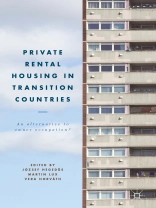This book presents an overview of private rented housing in selected new EU member states and other transition countries – a topic scarcely researched to date, as it is largely part of the informal economy, and consequently often invisible to official statistics. Part I presents the private rented sector in Western and Northern European countries, the history of private renting under socialism in Central and Eastern Europe, and thematic issues such as restitution and marginalized groups depending on privately rented housing. Part II provides a series of country case studies from the Central and East European region. Part III concludes with chapters on the possibility of utilizing the private rental sector in affordable housing provision through good practices in both old and new EU member states, and sets out to further the housing policy debate on European housing regimes. This unique edited collection will be of great value to scholars of and practitioners involved in housing policyand economics, urban development, international relations, politics, economics and sociology.
Daftar Isi
Part I. Private renting in transition countries: historical perspective and structural changes.- Chapter 1: Private renting in Western Europe.- Chapter 2: Private renting under socialism.- Chapter 3: Property restitution after 1990.- Chapter 4: The policy environment of private renting after 1990.- Chapter 5: Poor and vulnerable households in private renting.- Part II. Country case studies: history, current status and future prospects.- Chapter 6: Croatia: towards formalization.- Chapter 7: Czech Republic: growth and professionalization.- Chapter 8: East Germany: integration to a well-established environment.- Chapter 9: Estonia: limited potential for improvement.- Chapter 10: Hungary: growing role of a hidden sector.- Chapter 11: Poland: gradual growth across barriers.- Chapter 12: Russia: a long road to institutionalization.- Chapter 13: Slovenia
: untapped potential.- Part III. Conclusion: private renting – a viable alternative?.- Chapter 14: Private renting in social provision: Social Rental Agencies in Western Europe.- Chapter 15: Private renting in social provision: initiatives in transition countries.- Chapter 16: Central and East European housing regimes in the light of private renting.
Tentang Penulis
József Hegedüs holds a Ph D in Sociology and an MA in Economics. He is founding member and managing director of Metropolitan Research Institute, Hungary and he is co-editor of four comparative volumes on housing policy issues – emerging new housing systems, housing privatization, social housing, and housing finance – in post-socialist countries.
Martin Lux holds Ph D degrees in sociology and economy and is head of the Department of Socio-Economics of Housing at Institute of Sociology, Czech Academy of Sciences. His efforts have been supported by the Czech Science Foundation, Erhard Busek Price and others. He is editor-in-chief of Critical Housing Analysis.
Vera Horváth has been working at Metropolitan Research Institute since 2012, and is currently pursuing doctoral studies in sociology. She published papers on housing policy and rental housing in Europe.












